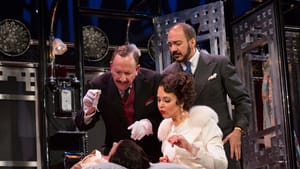Stay in the Loop
BSR publishes on a weekly schedule, with an email newsletter every Wednesday and Thursday morning. There’s no paywall, and subscribing is always free.
Death on wheels
McCarter Theatre presents Ken Ludwig's 'Murder on the Orient Express'

The enormous popularity of Agatha Christie's work remains undisputed: more than a billion copies sold in English, another billion in other languages. Outsold only by the Bible and Shakespeare. The Mousetrap still holds the title for longest-running play. Though she died in 1976 at 86 years old, Christie still sells cases of books every year.
For further proof, the McCarter Theatre Center in Princeton, New Jersey, a major regional theater that often produces important new American plays, premieres Christie's popular 1934 Hercule Poirot novel Murder on the Orient Express, adapted by Ken Ludwig, author of Lend Me a Tenor and Moon Over Buffalo. It's a frivolous exercise, however, and not only because of Sidney Lumet’s well-regarded 1974 film.
Money on stage
Artistic director Emily Mann pours considerable resources into Murder, including an accomplished 11-actor cast, Beowulf Boritt's shiny set -- the first-class cars of a freaking train! -- and William Ivey Long's sumptuous period costumes. The story's hardly ideal for the stage, but this stagecraft is impressive. Train cars move convincingly, helped by curtaining that isolates single cars and, sometimes, small compartments. That same innovation often squeezes actors into tiny spaces on McCarter's big stage, since the train cars are small and the individual cabins even smaller. But it all fits the period and gleams in Ken Billington's expert lighting.
Ludwig's lean yet jokey script (barely two hours with an intermission) quickly puts famous detective Poirot, played drolly by Allan Corduner, in Istanbul, where old friend Bouc (Evan Zes) arranges his ride on the famous train. A typically Christie assortment of eccentric personalities -- "like looking at a painting by Pablo Picasso," Poirot says of them later -- boards.
A familiar pattern
All make the most of their defining moments, especially the boorish Americans. Max von Essen plays a pushy businessman, with Juah Sorola as his flustered secretary, and Julie Halston is an oft-married Midwestern society woman. Susannah Hoffman plays Mary, a Brit having an illicit affair with Scot Col. Arbuthnot, also played by von Essen. Curt Russian Princess Dragomiroff (Veanne Cox) travels with meek Swedish nun Greta (Samantha Steinmetz). Beautiful Bulgarian Countess Andrenyi (Alexandra Silber) charms Poirot. It's great character-actor fun. They all have distinctive accents, quirky idiosyncrasies, and layers of lies. Even the conductor (Maboud Ebrahimzadeh, last year's Barrymore Award winner for Outstanding Lead Actor in a Play for Theatre Exile's The Invisible Hand) is a suspect because, of course, a murder occurs.
The train is an ideal murder-mystery setting: it's isolated, particularly during a treacherous trip through snowy mountains. Phones break down, the train gets stuck, no one can enter or exit. All are strangers. No one can be trusted. Who will die next?
Poirot interviews all the first-class passengers and examining evidence. Eventually, he calls the whole gaggle of suspects into the dining car -- a tight fit -- and, in ritualistic fashion, reveals the killer. It's great fun, though Poirot references much more information than the script introduces. The solution is, naturally, a surprise -- I was glad I had never read the book or seen the movie -- and it has unexpected power and relevance, raising questions about the nature of justice. "I cannot turn my back on the law," Poirot insists, but the law seems inadequate. "I wonder if this was justice," he muses in his final remarks to us (he also provides background narration early on).
Mann manages all this capably, and it's undeniably well crafted. But this Murder on the Orient Express feels more like a film than a play, particularly one based on a novel. It's quick and tidy but also dumbed down, like a musical comedy minus the songs. The play's biggest scene, the inevitable reveal, is underscored with intrusive movie music, as if Mann didn't trust the play's climax -- or us.
What, When, Where
Murder on the Orient Express. By Agatha Christie, adapted by Ken Ludwig, Emily Mann directed. Through April 12, 2017, at the McCarter Theatre Center, 91 University Place, Princeton, New Jersey. (609) 258-2787 or mccarter.org.
Sign up for our newsletter
All of the week's new articles, all in one place. Sign up for the free weekly BSR newsletters, and don't miss a conversation.
